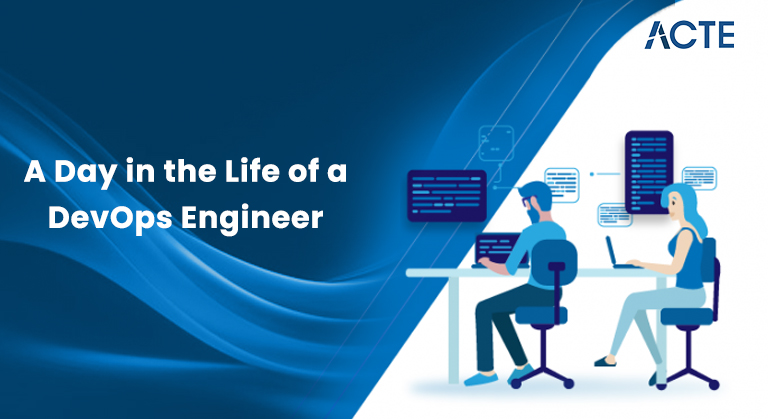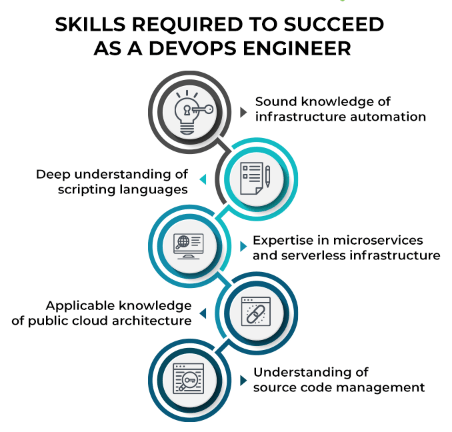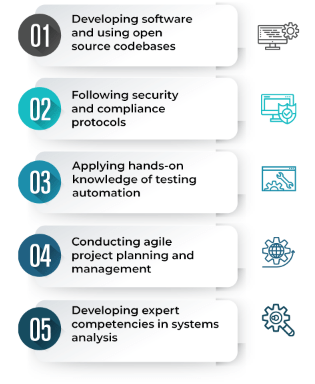
- Introduction to DevOps
- What is a DevOps Engineer?
- Key Skills and Tools for a DevOps Engineer
- Morning Routine: Starting the Day
- Midday Tasks: Collaboration and Continuous Improvement
- Afternoon Tasks: Monitoring, Troubleshooting, and Deployment
- Challenges Faced by a DevOps Engineer
- Conclusion
Introduction to DevOps
DevOps, short for Development and Operations, is a cultural and technical movement focused on enhancing collaboration between software development and IT operations teams. Its primary objective is to automate and streamline the processes involved in software development, testing, deployment, and monitoring, enabling faster, more reliable software delivery. DevOps Training plays a crucial role in helping teams adopt these practices, fostering collaboration, and enhancing their ability to deliver software efficiently and with higher quality. The DevOps engineer plays a critical role in this transformation, acting as a bridge between development and operations. They ensure that software is developed, tested, and deployed in a secure, efficient, and seamless manner. By automating workflows, managing CI/CD pipelines, and improving collaboration across teams, DevOps engineers contribute significantly to reducing errors and speeding up the delivery cycle. Their work ensures that organizations can meet the growing demands of the digital landscape while maintaining high standards of quality and security.
To Earn Your Devops Certification, Gain Insights From Leading Devops Experts And Advance Your Career With ACTE’s Devops Online Course Today!
What is a DevOps Engineer?
A DevOps engineer is a professional who works to streamline and automate the DevOps engineers play a key role in bridging the gap between software development (Dev) and IT operations (Ops). They are responsible for managing infrastructure, deploying applications, automating repetitive tasks, and ensuring that applications perform reliably in production environments. DevOps engineers are skilled in a range of tools and practices that support continuous integration (CI), continuous delivery (CD), and continuous testing, allowing for faster and more efficient software development cycles. Understanding DevOps vs Agile is crucial, as both methodologies focus on improving software development, but they emphasize different aspects Agile is centered around iterative development and collaboration, while DevOps focuses on automation, integration, and monitoring to streamline the entire software delivery process. They manage the entire lifecycle of an application, from the initial development and coding phase to its deployment and monitoring in production. By automating manual processes and optimizing workflows, DevOps engineers help improve system stability, reduce downtime, and enhance the overall quality of applications. Their expertise ensures that software is delivered quickly, securely, and with minimal disruption to end-users, contributing to the success of the organization’s technology initiatives.
Key Skills and Tools for a DevOps Engineer
To excel in the role, a DevOps engineer should be equipped with a blend of technical and soft skills. Here are some of the essential skills and tools:
- Programming/Scripting Languages: Proficiency in languages like Python, Bash, Ruby, or Go is essential for automating tasks and writing scripts for various operations.
- Version Control Systems: Familiarity with Git, GitHub, or GitLab is critical for tracking and managing code changes.
- CI/CD Tools: Jenkins, CircleCI, Travis CI, and GitLab CI are some tools that automate the process of building, testing, and deploying code.
- Infrastructure as Code (IaC): Tools like Terraform, Ansible, and CloudFormation automate infrastructure management and provisioning. Understanding DevOps and what it Means for Federal Agencies is crucial, as it helps improve efficiency, collaboration, and security in government IT operations.
- Containerization and Orchestration: Knowledge of Docker, Kubernetes, and OpenShift helps in deploying, scaling, and managing applications in containers.
- Cloud Platforms: Expertise in cloud services like AWS, Azure, or Google Cloud is key for provisioning and managing resources.
- Monitoring and Logging: Tools like Prometheus, Grafana, ELK Stack, and Splunk help DevOps engineers monitor applications, troubleshoot issues, and gather insights from logs.
- Soft Skills: Communication, collaboration, and problem-solving abilities are essential as DevOps engineers work across various teams, including development, operations, and quality assurance.
- Look at the Deployment Pipeline: Reviewing the status of ongoing deployments is essential.
- Plan for the Day: DevOps engineers prioritize tasks for the day. They might have to work on resolving incidents, optimizing processes, or collaborating on new feature deployments.
- Check Slack or Communication Channels: Many teams use Slack or similar tools for team communication. The Rise of DevOps has transformed how teams collaborate, enhancing efficiency and fostering continuous integration and delivery.
- Review Monitoring Dashboards: DevOps engineers typically use tools like Grafana, Datadog, or CloudWatch to monitor the health and performance of the systems. The first step is to check for any alerts related to high CPU usage, memory consumption, or failed deployments.
- Real-time Monitoring: DevOps engineers spend time ensuring that applications and infrastructure are running as expected. They analyze performance metrics and review logs from systems like Splunk or ELK stack to detect any anomalies or errors.
- Troubleshooting Issues: When things go wrong, it’s the DevOps engineer’s responsibility to quickly identify the problem and resolve it. Whether it’s a server crash, failed deployment, or poor system performance, troubleshooting is an essential part of their day.
- Handling Deployment Pipelines: Depending on the organization, a significant portion of the afternoon is spent managing the deployment of new code. Leveraging AWS DevOps Tools for Cloud Build and Deployment can streamline this process, automating and optimizing code deployment on the cloud.
- Deploying Updates or New Features: DevOps engineers are often the ones who deploy new releases of software. This might involve coordinating with the development and QA teams, ensuring all systems are ready for deployment, and using automation tools to push the new code to production.
- Balancing Development Speed and Stability: Ensuring that development moves quickly while maintaining system stability is a constant challenge. DevOps engineers must balance these two often conflicting priorities.
- Dealing with Complex Systems: Managing distributed systems, microservices, and a large number of containers can be complex and difficult to troubleshoot. Understanding What is Continuous Integration in Jenkins can help automate the integration process, making it easier to manage and troubleshoot complex systems.
- Maintaining Security and Compliance: Ensuring that systems are secure, updated, and compliant with industry regulations is a continuous challenge, especially with the ever-growing number of security threats.
- Managing Legacy Systems: Many organizations have legacy systems that are difficult to integrate with modern DevOps practices. These systems might not be easily automated or cloud-native, making them harder to manage.

To Explore Devops in Depth, Check Out Our Comprehensive Devops Online Course To Gain Insights From Our Experts!
Morning Routine: Starting the Day
A typical day for a DevOps engineer begins with reviewing the current status of the infrastructure and systems. The morning usually starts by checking automated alerts and monitoring dashboards for any ongoing issues.
Key Morning Activities:
Midday Tasks: Collaboration and Continuous Improvement
As the day progresses, DevOps engineers dedicate a significant portion of their time to collaborating with various teams and driving continuous improvement. A key aspect of their midday activities involves working closely with development and QA teams. They engage in discussions with developers to understand their infrastructure requirements, while also addressing deployment-related issues and performance concerns with QA teams. This collaborative approach ensures smooth integration, troubleshooting, and overall optimization of the software development lifecycle. A key responsibility of DevOps Training is automating processes like software testing, builds, and deployments. This involves working on scripts and CI/CD pipelines to reduce manual intervention. DevOps engineers may also work on provisioning and managing infrastructure, using Infrastructure as Code (IaC) tools like Terraform or AWS CloudFormation. They constantly work to optimize the CI/CD pipelines to ensure that new code is delivered faster and with fewer errors. During the day, DevOps engineers often review the security of the infrastructure, ensuring that the deployment is secure and that compliance standards are met.
Are You Considering Pursuing a DevOps Master’s Degree? Enroll For DevOps Masters Course Today!
Afternoon Tasks: Monitoring, Troubleshooting, and Deployment
In the afternoon, DevOps engineers focus on ensuring that everything continues to run smoothly. This involves monitoring, troubleshooting, and deploying new features or updates.
Key Afternoon Activities:
Challenges Faced by a DevOps Engineer
While the role is rewarding, it comes with its share of challenges. Some common challenges faced by DevOps engineers include:

Preparing for a DevOps Job Interview? Check Out Our Blog on DevOps Interview Questions & Answer
Conclusion
The role of a DevOps engineer is crucial and continuously evolving as organizations increasingly adopt cloud technologies and microservices. DevOps engineers are responsible for automating processes, monitoring infrastructure, and ensuring the smooth collaboration between development and operations teams. Their expertise in areas like CI/CD pipelines, cloud platforms, and infrastructure as code helps optimize the software development lifecycle, making it more efficient and secure. As businesses strive for agility, DevOps Training ensure that the deployment process is fast, reliable, and scalable. With the constant emergence of new technologies, security practices, and tools, DevOps engineers must stay updated to effectively address the challenges of modern software development. By balancing the needs of speed, quality, and security, they enable organizations to deliver high-performing applications with confidence. Their work may often go unnoticed, but it is vital to the success of any DevOps initiative.




